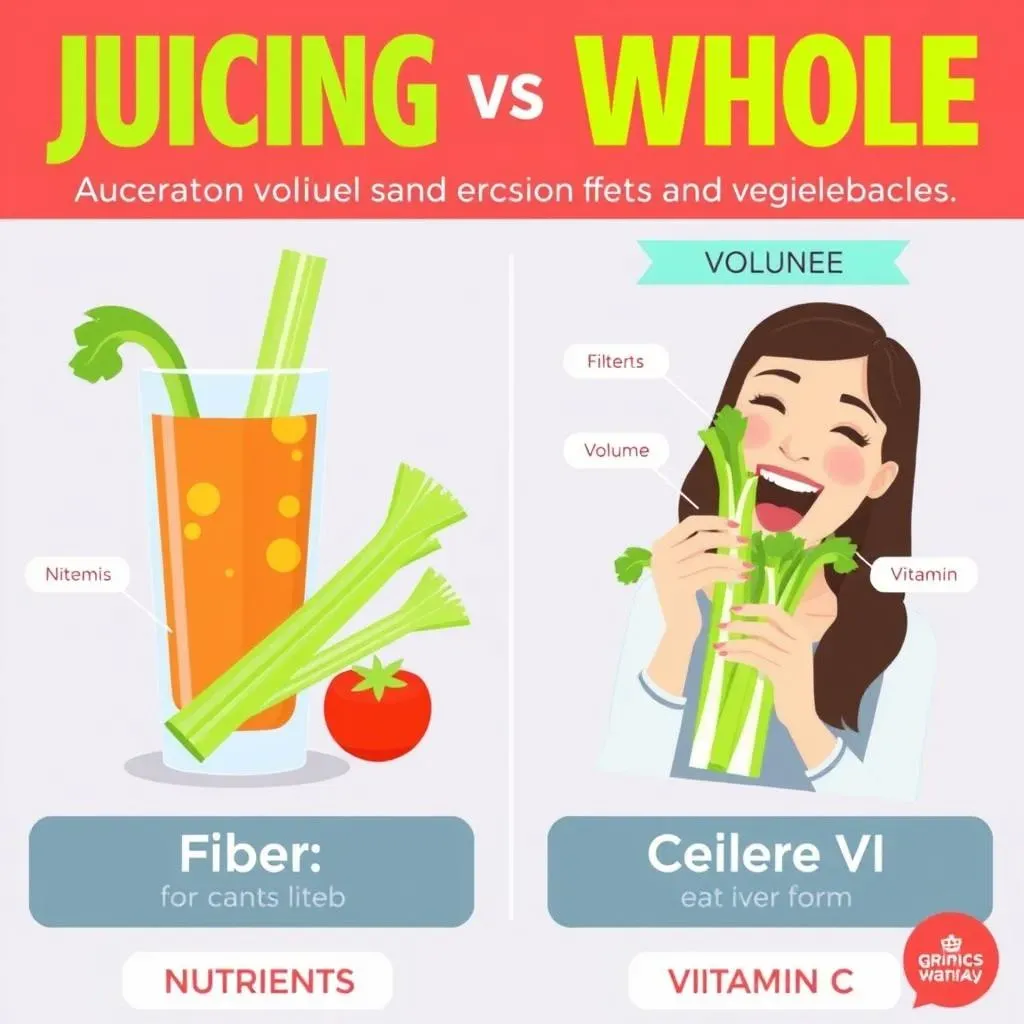Table of Contents
Celery juice. It's the green drink that's been all over social media, promising everything from glowing skin to a total body detox. But before you jump on the bandwagon, let's get real. Is this trendy drink truly a health elixir, or are there some hidden downsides? We're going to explore the facts, not the hype, about the side effects of celery juice detox. I'm not here to tell you it's a miracle cure or a total disaster, but rather to give you the straight scoop. We’ll start by looking at celery's actual nutritional value, then compare juicing to eating it whole. Next, we'll face the potential side effects of celery juice detox head-on. Finally, we'll talk about the real deal with those testimonials you've seen online. By the end, you’ll be able to decide if this green juice is the right choice for you. So, grab a glass of water—maybe not celery juice just yet—and let's get started.
Celery's Nutritional Value: More Than Just a Trend

Celery's Nutritional Value: More Than Just a Trend
The Humble Celery: More Than Just Water
Okay, let's talk celery. It's not exactly the rock star of the vegetable world, is it? We often see it as the crunchy, watery sidekick to dips, but there's more to it than that. Celery is actually packed with some pretty cool stuff. It’s low in calories, which is great if you're watching your weight, but it’s also got some important vitamins and minerals. It contains vitamin K, which is important for blood clotting, and some potassium, which helps with blood pressure. Not bad for a simple stalk, right?
And don't forget about antioxidants! These little guys help protect your cells from damage. Celery has a decent amount of these, which means it's helping your body fight off the bad stuff. So, yeah, it's not just a watery stick; it’s a little nutritional powerhouse hiding in plain sight. It's like that quiet kid in class who turns out to be a genius; celery is the unsung hero of the veggie drawer.
Beyond the Basics: Celery's Hidden Benefits
Now, I know what you're thinking, "Okay, it's got some vitamins, big deal." But there's more to it than just basic nutrition. Celery also has compounds that might help with things like blood sugar and cholesterol. While the research is still ongoing, there’s some evidence that these compounds could have a positive impact. Now, I'm not suggesting it's a magical cure-all, but it's definitely worth noting. It's like finding a hidden level in your favorite video game; there's more to discover than you initially thought.
Plus, it's a good source of fiber, which is super important for keeping things moving in your digestive system. Fiber helps you feel full, prevents constipation, and keeps your gut happy. So, while celery might not be the most exciting vegetable on its own, it's definitely a good addition to your diet. It’s like the reliable friend who’s always there for you, even if they're not the flashiest one in the group.
Nutrient | Amount per stalk (approx.) | Benefit |
|---|---|---|
Vitamin K | 30 mcg | Blood clotting |
Potassium | 104 mg | Blood pressure |
Fiber | 0.5 g | Digestion |
Antioxidants | Varies | Cell protection |
Juicing vs. Eating: What You Lose and Gain

Juicing vs. Eating: What You Lose and Gain
The Great Fiber Escape
Okay, so you've decided to hop on the celery juice train. But have you ever stopped to think about what happens when you turn a whole stalk of celery into a liquid? The biggest thing you’re losing is fiber. When you juice, you're essentially taking out all the good stuff that keeps your digestive system happy. Fiber is like the broom for your gut; it helps sweep out waste and keeps things moving smoothly. Without it, you're just getting the juice, which is like watching a movie without the sound—it's just not the full experience.
Think of it like this: eating a whole orange is way different than just drinking orange juice. The juice is quick and easy, but the whole fruit has all the fiber and other good stuff that your body loves. Same deal with celery. You might get a concentrated dose of some vitamins and minerals, but you're missing out on the bulk that keeps you feeling full and satisfied. I mean, who wants to feel hungry again 30 minutes after their "healthy" drink? Not me.
Concentrated Nutrients, Concentrated Concerns
Now, it's not all bad news. When you juice celery, you do get a concentrated dose of some vitamins and minerals. Since you're using more celery to make juice than you would eat in a single sitting, you are, technically, getting more of those nutrients. It's like taking a shortcut to some of the good stuff. However, this also means you're concentrating other compounds, too, some of which might not be so great in high amounts. It’s a bit like turning up the volume on your favorite song, you might get more of the good parts, but you'll also amplify the bad ones too.
Also, some vitamins, like vitamin C, can break down when exposed to air and heat during the juicing process. So, while you might think you're getting a super boost of nutrients, some of them might be lost along the way. It’s a bit of a trade-off, really. You gain some concentration but lose fiber and potentially some vitamins. It's like trying to get the perfect picture, sometimes you have to sacrifice a little to get what you want, but is it always worth it?
Factor | Juicing | Eating Whole |
|---|---|---|
Fiber | Removed | Present |
Concentrated Nutrients | Yes | No |
Vitamin C | May be reduced | Preserved |
Volume | Higher | Lower |
Side Effects of Celery Juice Detox: What You Need to Know

Side Effects of Celery Juice Detox: What You Need to Know
The Not-So-Sweet Side of Celery Juice
Alright, let's get down to the nitty-gritty. While celery juice is often touted as a health miracle, it's not all sunshine and rainbows. Some people can experience some pretty unpleasant side effects, especially when doing a "detox" with large amounts of the stuff. One common issue is digestive upset. All that juice, especially on an empty stomach, can cause bloating, gas, and even diarrhea for some folks. It's like your gut is saying, "Whoa, hold up, what was that?" It's not a fun party for your tummy.
Another thing to watch out for is potential allergic reactions. Celery is actually a pretty common allergen, and if you're sensitive to it, you might experience itching, hives, or even more severe reactions. It's kind of like that surprise party that turns out to be a disaster. And, because celery is high in vitamin K, it can interfere with blood-thinning medications. If you're on those, you definitely need to chat with your doctor before you start chugging celery juice like it's the fountain of youth. It's about being smart, not just blindly following trends.
More Than Just Tummy Troubles
But wait, there's more! Celery contains compounds called furanocoumarins and psoralens, which can make your skin more sensitive to the sun. So, if you're loading up on celery juice and spending time outdoors, you might end up with a nasty sunburn. It's like forgetting sunscreen at the beach, a painful mistake you want to avoid. Plus, there are concerns about potential kidney problems from excessive celery juice consumption. The high oxalate content can contribute to kidney stones in some people who are predisposed to them. It's like adding fuel to a fire, if you're already at risk, celery juice could make things worse.
And, let’s not forget about the lack of fiber. We talked about that before, but it's worth repeating. Without fiber, you're not just missing out on the digestive benefits; you're also potentially messing with your blood sugar levels. The sugar in the juice is absorbed more quickly without fiber, which can cause blood sugar spikes and crashes. It’s like a rollercoaster ride your body didn't sign up for. So, yeah, celery juice isn’t as innocent as it seems. It’s important to be aware of these potential side effects before you start making it your go-to drink. It’s better to be informed and make smart decisions for your health.
Side Effect | Description |
|---|---|
Digestive Upset | Bloating, gas, diarrhea |
Allergic Reactions | Itching, hives, severe reactions |
Sun Sensitivity | Increased risk of sunburn |
Kidney Issues | Potential kidney stone formation |
Blood Sugar Spikes | Rapid absorption of sugar without fiber |
Debunking Celery Juice Myths: Real Talk About Testimonials

Debunking Celery Juice Myths: Real Talk About Testimonials
The Power of Placebo: Why We Believe
Okay, let's talk about those glowing testimonials you see online. People claiming celery juice cured their acne, healed their gut, and made them feel like a superhero. It’s easy to get swept up in the enthusiasm, right? But here’s the deal: a lot of what we experience is influenced by the placebo effect. This means that if you believe something is going to work, your body might actually respond as if it is working, even if there's no real magic behind it. It's not that these people are lying, but their experiences may be more about their mindset than the juice itself. It's like when you think you're getting a super-expensive treatment, and suddenly, you feel amazing, even if it's just a sugar pill.
Also, many of these testimonials are anecdotal, meaning they're based on personal stories, not scientific evidence. While personal experiences can be valuable, they don't always apply to everyone. One person's miracle cure could be another person's tummy ache. It’s like reading a book review; one person may say it's the best book ever, while another might say it's a total snooze fest. We all have different bodies and different reactions. So, it’s important to be skeptical and look for reliable research, not just personal stories. It's about being smart and not getting caught up in the hype.
The Truth Behind the Hype: What the Science Says
Now, don't get me wrong, there's nothing wrong with wanting to feel better, and sometimes trying new things can be helpful. But when it comes to celery juice, the scientific evidence is pretty limited. There just aren’t a ton of studies that back up all the amazing claims you see online. Most of the research on celery focuses on the whole plant, not just the juice. And, while those studies show some potential benefits, they’re not the same as saying that the juice is a miracle cure. It's like comparing a marathon runner to someone who just does a light jog, they are both running but at different levels.
And, let's be honest, a lot of the "detox" claims are pretty bogus. Your body has its own built-in detox system, your liver and kidneys. They do an amazing job of cleaning things out without the need for special juices or cleanses. So, instead of relying on a trendy drink, it's often better to focus on a balanced diet, plenty of water, and regular exercise. It’s like trying to fix a car with a band-aid when you need a mechanic. Sure, it might seem like a quick fix, but it's not addressing the real problem. It's about being practical and focusing on long-term, sustainable health habits.